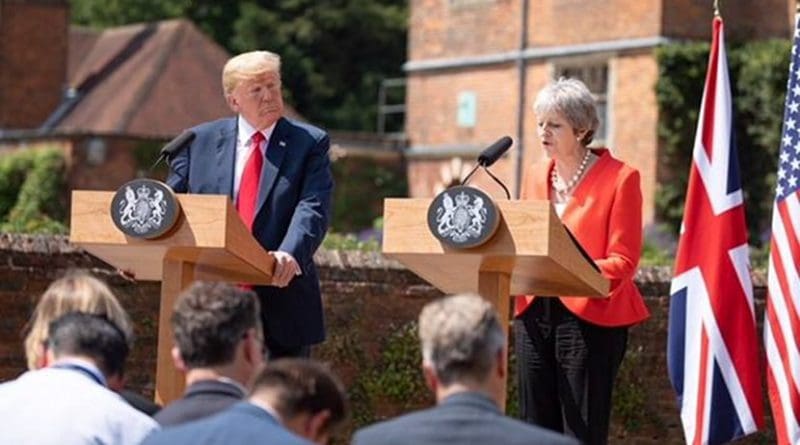A Very American Coup? – Analysis
By Published by the Foreign Policy Research Institute
By Jeremy Black*
(FPRI) — Views can vary on what President Trump was trying to do on his recent visit to Britain. The individual pieces are pretty clear. Trump criticized the proposed Brexit deal which the Cabinet had agreed after long debate. He also praised Foreign Minister Boris Johnson as a great potential Prime Minister, even as Johnson, having agreed to the deal last weekend, resigned soon after and is now generally considered a rival to Prime Minister Theresa May. Each of the President’s remarks can be defended as those of a candid friend. But do they amount to more? In particular, is there an attempt to move Britain toward a stance that more clearly matches that of the President, under a Prime Minister other than Theresa May?
The President has certainly made his hostility to the European Union clear, and the US Embassy in London has been asking for a while as to whether May will retain her position. So, it is possible that the President is laying the groundwork for the future.
There is also the specific nexus of defence, with the American government pressing hard for higher military expenditure, while British politicians and military figures keen on the same seek to elicit American support of their goals.
It is, of course, entirely appropriate to encourage allies to move in a certain direction, but it can also be badly counter-productive. Indeed, to make a comparison that will not please the President, he is in danger of repeating the mistake of President Obama who very publicly in the run-up to the 2016 EU membership referendum tried to support his ally Prime Minister David Cameron by urging voters to endorse continued EU membership. That proved as maladroit as Obama’s subsequent intervention on the Italian constitutional referendum. In each case, the intervention was seen as counterproductive, increasing support for the opposite viewpoint and dooming the President’s preferred option.
It is not difficult to see why this occurred. People do not like being told what to do, and particularly so if the advice is coming from foreigners. Imagine if Britain’s head of state, the Queen, popped up in the US and gave an interview to the New York Times supporting universal healthcare or gun control; or if President Macron had used his recent state visit to call for whatever the Democrats or Republicans dislike. It is possibly the prerogative of the powerful to be particularly free with their advice, and the President is the most powerful individual in the world. That, however, may make the advice more unwelcome.
Ironically, that means if President Trump is trying to achieve more than just giving advice, then his recent intervention has probably not helped his cause. Johnson already faces many problems. Trump’s support increases them. It will not encourage loyal Conservative MPs to back Johnson who is perceived as an unreliable maverick. Moreover, the general perception among the well-informed is that Johnson has been a poor Foreign Secretary. For him to be described by Trump as likely to be a “great Prime Minister” strains credibility.
Trump appears to have perceived that he made a mistake by quickly rowing back on his criticism of May: “It’s called fake news,” he said, despite the fact that his interview with The Sun was recorded. He also watered down his criticism of the Prime Minister’s approach to Brexit. “So, if they go in a slightly different route,” he hedged, “and I know they do want independence, it’s going to be independence, it’s just your definition.”
More interesting than parsing the words is what this latest to-do tells us about the different political systems between Britain and the US. Trump rose to power by circumventing the conventional party structure and political system, and Johnson appears to be trying to do the same. Yet their situations are very different. The American President does not come to power as a consequence of winning the support of his party counterparts in Congress, whereas the British Prime Minister has to have the backing of his/her parliamentary colleagues. There is no current mechanism for circumventing Parliament and no prospect for a directly-elected Prime Minister, or for a politician to gain party leadership by such a means if the parliamentary party is resolved to avoid such a contest. After all, Theresa May gained her post in 2016 because the party decided on her as the most generally appealing candidate.
It is easy to understand how the President might want to have a reliable (in his eyes) British Prime Minister, but it is best to deal with the one who is in power. Theresa May is a highly-experienced politician, who was one of the leading ministers within Tory governments since 2010 before becoming Prime Minister in 2016. She is sensible, honest and determined, as well as being pro-American. For the United States to encourage her overthrow would be foolish. If Brexit is to be achieved at all in any sensible fashion, she is most likely to get it through Parliament. Furthermore, if May fails, her successor is more likely to be Jeremy Corbyn, the leader of the opposition Labour Party. He is consistently anti-Western, hostile to NATO, and opposed to American policy. Johnson, in comparison, would be less of a problem, but he would probably fail to keep the Conservative Party together or to get government business through Parliament.
For all those reasons, it is better that the President, who presumably means well, for his country, Britain, and the West, has backed away from his intemperate remarks. Hopefully, this will only be a blip as Britain and the US plan for the future.
About the author:
*Jeremy Black, an FPRI Templeton Fellow, is professor of history at Exeter University.
Source:
This article was published by FPRI.

